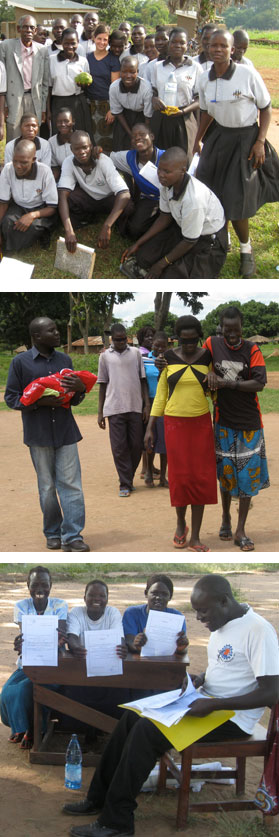In close collaboration with the Norwegian Refugee Council’s Youth Education Pack (YEP), vivo started up the development of a long-term psychosocial support system which has so far reached 600 war-affected youths in vocational training centres all over Uganda’s war-torn North. YEP supports most severely affected learners, many of them formerly abducted child soldiers, within ten vocational trainings centres. Within the YEP program learners are enabled to learn practical vocational skills and catch up on academic education in order to reintegrate better within their communities after their return home.
In 2009, over a period of 6 months vivo has trained ten former teachers as counsellors. They have provided psychosocial support services to the affected learners on the spot in schools. The low threshold program is tailored not only to reduce mental health related symptoms of PTSD, depression and suicidality in NRC’s beneficiaries, but also to enhance reconciliation attempts and non-violent forms of conflict resolution strategies as well as to, overall, boost learner’s reintegration and rehabilitation. Within the current project vivo undertook not only training and supervision of trauma treatments, but also new group-based strategies to foster peace building initiatives in Northern Uganda.
vivo developed “Conflict Resolution Skills and Social Competence Trainings” promoting non-violent forms of settling disputes in learners. Based on individual life-stories, vivo also educed a peace education and human rights-focused approach called “NET truth” to encourage mutual understanding and open communication about war experiences and psychosocial needs among students. Also stigmatisation is aimed to be reduced with this approach.
A third component vivo introduced in the YEP centres was “teacher counselling” which is based on teacher’s jointly collected most prominent views on psychosocial problem fields among their students and solving strategies.
For six months, vivo-experts trained the ten new counsellors intensively in all psychosocial approaches in workshops and practical on the job trainings with extensive vivo-expert supervision. With the help of nine local vivo counsellors, the ten newly trained former teachers were so far able to carry out the above mentioned interventions with more than 600 learners who had endured gross forms of violence and human suffering during war.
400 of all students who took part in interventions were interviewed with regard to psychological problems and further psychosocial well being prior to the running of interventions. Currently, follow-ups of the treated students are conducted in order to develop a best-practice manual on psychosocial support within the educational sector in post-conflict Northern Uganda and in order to adjust the support system for future students in the most effective way.
In close collaboration with the Norwegian Refugee Council’s Youth Education Pack (YEP), vivo started up the development of a long-term psychosocial support system which has so far reached 600 war-affected youths in vocational training centres all over Uganda’s war-torn North. YEP supports most severely affected learners, many of them formerly abducted child soldiers, within ten vocational trainings centres. Within the YEP program learners are enabled to learn practical vocational skills and catch up on academic education in order to reintegrate better within their communities after their return home.
In 2009, over a period of 6 months vivo has trained ten former teachers as counsellors. They have provided psychosocial support services to the affected learners on the spot in schools. The low threshold program is tailored not only to reduce mental health related symptoms of PTSD, depression and suicidality in NRC’s beneficiaries, but also to enhance reconciliation attempts and non-violent forms of conflict resolution strategies as well as to, overall, boost learner’s reintegration and rehabilitation. Within the current project vivo undertook not only training and supervision of trauma treatments, but also new group-based strategies to foster peace building initiatives in Northern Uganda.
vivo developed “Conflict Resolution Skills and Social Competence Trainings” promoting non-violent forms of settling disputes in learners. Based on individual life-stories, vivo also educed a peace education and human rights-focused approach called “NET truth” to encourage mutual understanding and open communication about war experiences and psychosocial needs among students. Also stigmatisation is aimed to be reduced with this approach.
A third component vivo introduced in the YEP centres was “teacher counselling” which is based on teacher’s jointly collected most prominent views on psychosocial problem fields among their students and solving strategies.
For six months, vivo-experts trained the ten new counsellors intensively in all psychosocial approaches in workshops and practical on the job trainings with extensive vivo-expert supervision. With the help of nine local vivo counsellors, the ten newly trained former teachers were so far able to carry out the above mentioned interventions with more than 600 learners who had endured gross forms of violence and human suffering during war.
400 of all students who took part in interventions were interviewed with regard to psychological problems and further psychosocial well being prior to the running of interventions. Currently, follow-ups of the treated students are conducted in order to develop a best-practice manual on psychosocial support within the educational sector in post-conflict Northern Uganda and in order to adjust the support system for future students in the most effective way.


